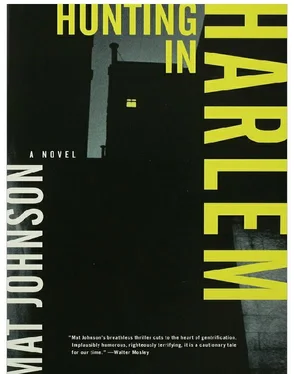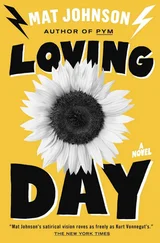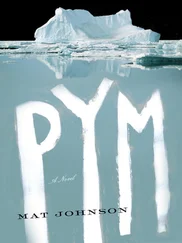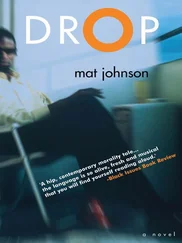The three in immaculate tuxedos, good shoes, even their socks matched. The three affording this because of two months of actually showing clients around, the Second Chance stipend being increased, and Metzer's Formal Wear's buy-two-get-one-free sale. The deal was only for wedding parties, so Horus played the groomsman. Temps had been hired to lift boxes into the homes they'd helped sell, taking the job now beneath them. The three looked so respectable even they could believe they were.
Most of the attendees had never spent much time in Harlem before. (Sharing the dining room of Sylvia's with busloads of German tourists didn't count.) Snowden had seen the guest list, typed out the envelopes himself, had gathered enough from Lester's comments to know who many of them were, even the ones whose faces he didn't recognize. The majority were the highest-ranking black employees of New York's most respected industries, male and female. The rest were cops and parole officers.
The parole officers could be easily identified by their cheap shoes, but Snowden didn't need that marker. Even in the context of these festivities, they stood out to him. They looked like people who spent all day being lied to. They were what happened when the secular, unblinded by faith, spent their lives dealing with humanity's worst at their worst. Worn, mundane, bitter — they were like office coffee left to burn on the plate for days. Snowden hugged walls, kept his nose in his drink, assumed they too could identify him at a glance. They were nothing like the congressman who greeted newcomers at the front door, transcending his bestial frame with elegance, success, and by standing at the top of steep steps. It was obvious to Snowden that the homicidal hedgehog was their hero. His rise from their ranks to become the president of the Parole Division Union, to Congress, to wealth back in the place he served as a public servant was legendary. Tens of them, dusty, smiling creatures, walking around the lodge like they owned it as much as he did.
No cameras, aside from private ones. Regardless of the many media folks in attendance, no press reports were to be written about the event at all, as per the invitation's request. A large but private function. A moment for black America's best and brightest to enjoy Harlem's renewal, take note that its time had returned, sample its possibilities, and maybe take a Horizon card from the discreet stand by the door on the way to their cab back downtown. No party worth attending was publicly reported on.
The upper tenth of the Tenth. Most seemed to at least recognize each other, or pretend not to, or assume they were being recognized themselves, their private motions a dramatic interpretation of ease.
A lack of notable weather patterns raised the prominence of housing as a casual discussion topic, a New York City favorite made that much more appropriate by the occasion. Where do you live, what part, what size, how much? In New York, the questions were not considered rude or intrusive, because there was no way you could answer wrong. If you paid a lot it was a tribute to your wealth, bonding ground for the overpaying majority. If you paid barely anything at all it was a testament to your good fortune and ingenuity. Residence in the best neighborhoods was a source of pride, but residency in the worst even more so. It meant you were a visionary pioneer, braving the urban elements to bet on the next slum to become the next Utopia.
Not used to free food or drink, Snowden was both full and drunk by the time he'd arrived at the lodge for his entree. The rest of the guests weren't far behind him. This was when he noticed the first accident talk. Someone walking up the lodge's front steps slipped, sent a hand shooting for purchase on the wide stone banister. A voice in the crowd behind said, "Careful there, hold on tight! You don't want to be another clumsy Negro at the morgue!" Snowden, who always clenched the railing for that very reason, at first thought the warning was directed at him, then loosened his grip ever so slightly.
Inside and warmed, that incident had already been drained of reality for him, a moment of paranoia, vestiges of guilt he knew he was still susceptible to. Then came a guest's joke announcement warning the crowd to be "extremely careful" with their leftover appetizer toothpicks. Followed by a yell from across the room to be wary of the electric sockets, followed by another's calm reassurance that with nearly 200 folks in attendance, statistics said at least 190 had absolutely nothing to worry about. Greater laughter greeted everyone. All the fear returned, Snowden moved quickly away from the sound, was the first to find his place card at a table and sit down. From behind him, a man in the crowd claimed to have dressed as the Chupacabra for Halloween as well. Together, he and his companions threw out conjectures about what one might look like. Snowden tried to hum them out, still heard pieces of the man's story, something about sewing on dried pig snouts from the pet store.
"A morbid bunch, aren't they?" The other man had a place card in his hand, picked up two more to read before selecting the seat next to Snowden. He looked boring and the kind of person who enjoys sharing his gift of boredom with others. Snowden nodded, wished there was something at the table he could pretend to be preoccupied with.
"Well, it's nuts, the way everybody's bugging out. I guess they don't really believe it. Because it's not true," Snowden offered, began busying himself with the pockets inside of his coat as if there was something in them.
"They don't believe it can happen to them. They're not poor, uneducated. Plus," the other turned smiling, "who doesn't love an urban legend? Especially black folks."
"Menthol cigarettes were genetically engineered to be especially addictive to blacks."
"Right, I remember that one. Tropical Fantasy soda was produced by the Klan to make us sterile."
"And the Klan makes all those crown air fresheners too, and Snapple, that's why they have little k's on every bottle," Snowden told him.
"The government tracks us by giving us an even fifth digit number on our Social Security numbers, and whites get an odd number," the man said.
"Right, right! And they're the ones who infected us with syphilis just to see the effects."
"Well, no." The guy paused to frown. "No, that actually happened. You know, it was called the Tuskegee Experiment."
"Oh, that's right, that's right. I knew that. It gets confusing."
"The important thing is that they're joking about it. They're not buying into it. They're buying houses instead. I'm just happy for Congressman Marks, he really deserves this. He's had a hard time of it, over the years, it's good to see things finally working out."
"You know the congressman?" Snowden turned to get a better look at him.
"Oh yeah. I've know him for years. He was my parole officer, long ago, if you can believe that. If you can believe I was ever nineteen with no greater aspiration than to tag up subways with a squiggly nom de plume."
Snowden looked to the table, saw "Lincoln Jefferson" on the card in front of the man.
"You're the guy that wrote the article. The article about the accidents."
"You read that? That's the good thing about having a stupid name, people remember. My dad, he sold beauty products to salons, he swore by it. His name was Bill but just for that he had it legally changed to Thomas. Yeah, that piece was the least I could do for the congressman. It's a good thing to see all this happen for him. I don't know how well you know him — you're one of the Second Chance proteges right? Lester pointed you out. Lester deserves this too. Shit, Harlem deserves this."
"You know Lester too?" Snowden's question at first just got dismissive laughter in response. Lincoln swiped his drink off the table, leaned forward into Snowden's ear. The room was getting so crowded that others were searching for their assigned seats as well. Snowden now wanted them gone, back to their callous laughter.
Читать дальше












